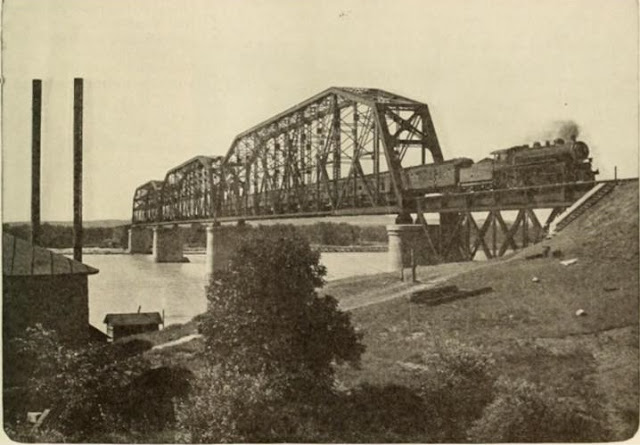1961 RR: (Bridge Hunter; John A. Weeks III; Satellite)
1924 US-12: (Bridge Hunter)
1959 US-12: (Bridge Hunter; John A. Weeks IIII; Satellite)
 |
| Chris Yeoman commented on his post (below) |
 |
| Chris Yeoman posted Eastbound grain train at Mobridge SD today crossing the Missouri River / Oahe Reservoir. [The US-12 bridge is peaking out above the train.] Edward Davies When the River got wider the railroad decided that they needed Mobridge. Paul Martig The town was actually named after the bridge, or more precisely for the original railroad designation of the location for the original railroad bridge. The designation was Missouri Bridge, which got shortened to Mobridge. Isn't Wikipedia wonderful? |
 |
| Mobridge in History posted Original railroad bridge construction approx. 1908. Mark Taylor shared |
 |
| Mobridge in History posted Original Chicago Milwaukee RR bridge near Mobridge. Mark Taylor shared Fred Hyde: Yup. Now under Lake Oahe. |
 |
| Mobridge in History posted Approx. 1959 news photo of construction of the new highway and railroad bridges in anticipation of the high water due to the building of the Oahe dam in Pierre, SD. (0riginal railroad bridge from 1908 still standing in between) Mark Taylor shared |
 |
| Public Domain via Bridge Hunter |
 |
| March Thorpe posted Aerial view of the original railroad bridge over the Missouri River near Mobridge. Dale Drawbond shared Mobridge in History posted Mark Taylor shared Arlin Veitz: Is this the bridge before lake ohae was built?? Mike Savona: Arlin Veitz Yes |
 |
| Mobridge in History posted C.M. St. P. Bridge Across The Missouri, Mobridge, SD. Diane Kindt: This was the railroad built about 1908 and taken down in the late 1960s Mark Taylor shared |
 |
| Mobridge in History posted Original C. M. & St. P. Railroad bridge across the Missouri River at Mobridge, SD. Mark Taylor shared |
Mobridge in History posted three photos with the comment: "C. M. & St. P. passenger train crossing the Missouri River bridge near Mobridge approx. 1915."
Paul Zuber shared
 |
| Mobridge in History posted Milwaukee Bridge across the Missouri River, Mobridge, SD. (original railroad bridge) Mark Taylor shared |
 |
| Mobridge in History posted Early 1960’s construction of the BNSF railroad bridge. Brian Machart: Time to correct the caption. Built for the Milwaukee Road and current BNSF bridge. Mark Taylor shared Kevin Konechne: William Lloyd that was the milwaukee road pacific extension at the time. Then the state of south dakota owed it for awhile after milwaukee tried to abandon it during bankruptcy in 1980s and leased it to BN. After a few years of ownership the state then eventually sold the line to BNSF. Mike Savona: Kevin Konechne An interesting piece of history, the Milwaukee Road DID abandon this section of railroad in 1982, following the final Milwaukee movements at the end of March. It was only without an operator for around 20 days, as Burlington Northern resumed service on 4-20-1982. On August 30, 1991, ownership of the mainline was transferred from the state of South Dakota to Burlington Northern. |
 |
| Fred Hyde commented on the above post I posted before and here it is again. 1981. My photo |
Note the above railroad and road bridges crossed a lot skinnier river than today's bridges cross.
 |
| Street View [The railroad bridge is in the foreground and the US-12 bridge is in the background.] |
That is because this location is now part of Lake Oahe, which is the reservoir created by the Oahe Dam.
 |
| John Weeks - BNSF [There is a long embankment in the reservoir on the left.] |
 |
| Paul Everett photo via Bridge Hunter, License: Creative Commons Attribution-Share-Alike (CC BY-SA) |
 |
| John Weeks - US-12 |
 |
| TravelsWithTwinkles |
I accessed an old topo map to see what the river looked like before the dam was built. I was shocked to discover that the oldest map available, 1953, shows the river to be as wide as it is today. I was shocked because they just started construction in 1952, and it wasn't closed until 1958. And it took four years to fill up enough so that they could start producing hydroelectric power.
So I wondered if the cartographer was trying to "future proof" his map. After all, he has all of the contour information needed to predict where the new river banks would be. Indeed, he did anticipate the future because the 1958 map shows the reality of the 1950s.
 |
| 1953 McIntosh Quadrangle @ 1:250,000 |
 |
| Satellite |
 |
| 1958 McIntosh Quadrangle @ 1:250,000 |
3 photos (There are several interesting comments including more photo.s)



No comments:
Post a Comment